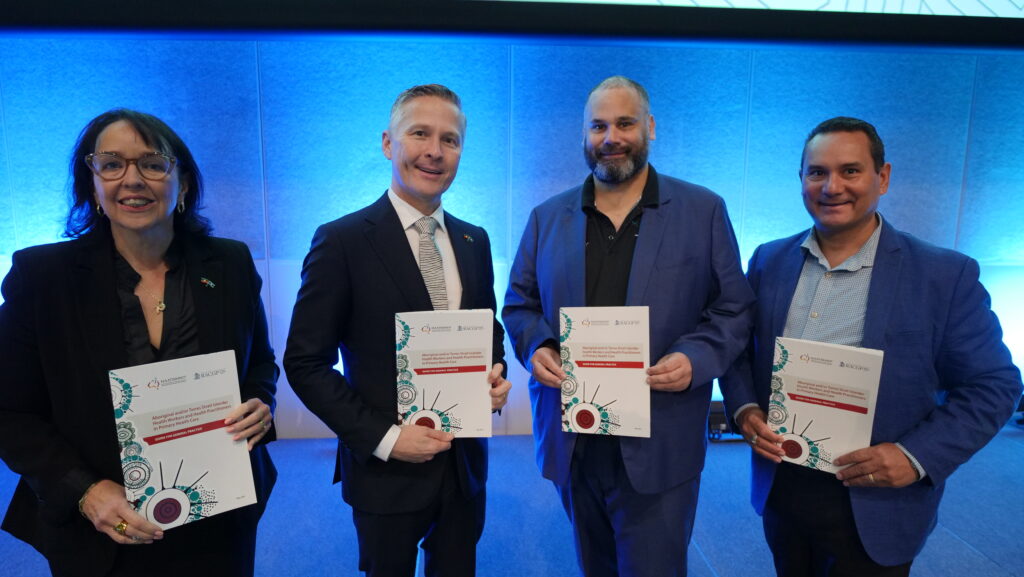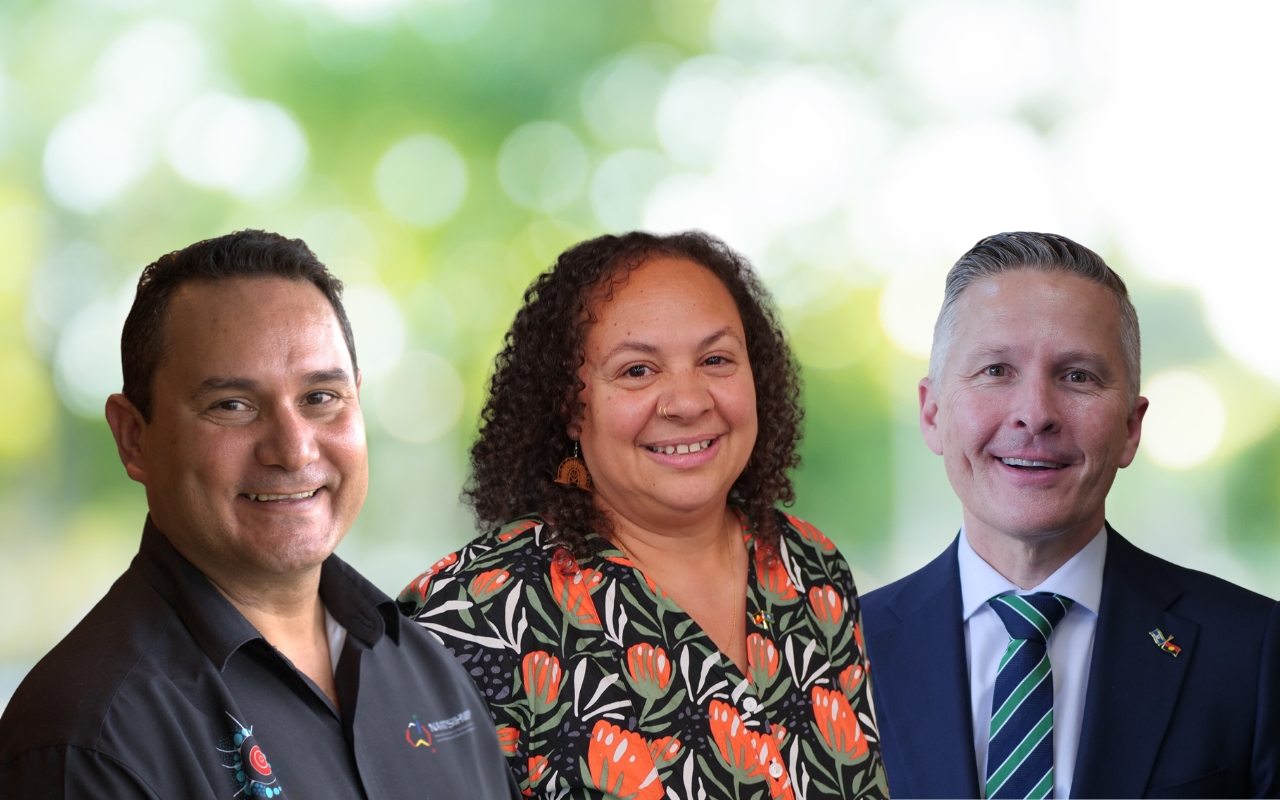The RACGP and NAATSIHWP launch guide to advance and shape the future of culturally safe multidisciplinary care in general practice.
On 26 May 2025, the Royal Australian College of General Practitioners (RACGP) invited the National Association of Aboriginal and Torres Strait Islander Health Workers and Practitioners (NAATSIHWP) to launch their Aboriginal and/or Torres Strait Islander Health Workers and Health Practitioners in Primary Health Care – Guide for General Practice (the Guide) at the RACGP Practice Owners Conference.
As an RACGP endorsed professional resource, the Guide is designed to support general practices to understand, employ to their full potential, and retain Aboriginal and Torres Strait Islander health workers and health practitioners as integral members of multidisciplinary teams providing high quality, accessible and culturally safe health care.

About the professions
Aboriginal and Torres Strait Islander health workers and practitioners are two distinct but related professions that together form one of the world’s only culturally based health workforce underpinned by national regulation and training.
Both professions play a unique and critical role in Australia’s health care system. They are a vital and reliable community resource, essential in the delivery of culturally safe, responsive clinical and non-clinical health care. Created by and for Aboriginal and Torres Strait Islander people, both roles are perhaps the most significant example of self-determination in Australia’s health system. Far from peripheral, they are central to achieving health equity. A focus on growing and developing both professions is not optional — it is imperative to accelerating improved Aboriginal and Torres Strait Islander health and wellbeing outcomes.
The key differences between Aboriginal and Torres Strait Islander health workers and practitioners are in their qualifications, scope of practice and regulatory status.
Aboriginal and Torres Strait Islander health workers primarily focus on health promotion, education, early intervention, prevention and community engagement. They play a critical role in supporting health literacy, building trust and keeping individuals and families connected to health care services. Depending on their level of qualification, their practice may include the delivery of routine clinical tasks either independently or under supervision. Their practice is not registered.
Aboriginal and Torres Strait Islander health practitioners have a higher level of clinical skills. Accordingly, they must meet practice standards and register with the Aboriginal and Torres Strait Islander Health Practice Board of Australia (ATSIHPBA). Practitioners can work autonomously, and their skills include conducting health assessments, managing chronic disease, administering medications including injections and immunisations (subject to jurisdictional authorisation), wound care and supporting clients in navigating care pathways across the health system. They can also play a role in clinical decision making, care planning and the integration of cultural knowledge into clinical practice, making them uniquely positioned to deliver holistic and person-centred care.
About the Guide
The Guide was developed by NAATSIHWP to support GPs and practice managers to understand and effectively embed these roles into models of care in a cost-effective and sustainable way.
The Guide demonstrates how the professions can be integrated into multidisciplinary health care teams by supporting high quality clinical and non-clinical care, including in Aboriginal and Torres Strait Islander health checks, GP chronic condition management plans, team care arrangements and the provision of follow-up care. Further, it clarifies the wide range of the Medicare Benefits Scheme (MBS) item numbers applicable to the professions, and outlines strategies for supporting Aboriginal and Torres Strait Islander health workers and health practitioners in general practice and multidisciplinary settings.
The value of the workforce in general practice
While currently underutilised in general practice settings, embedding Aboriginal and Torres Strait Islander health workers and health practitioners into models of care is an effective way of supporting health care services to be culturally safe and responsive to the needs of Aboriginal and Torres Strait Islander people.
With lived experience in and a deep understanding of the communities they serve, Aboriginal and Torres Strait Islander health workers and health practitioners can support general practices to achieve and sustain improved health outcomes for their Aboriginal and Torres Strait Islander clients. They can act as the first point of contact with patients, assist with clinics and outreach programs, develop complex health care plans and promote lifestyle change and help keep people connected to care. They grow the profile of a practice by attracting and retaining Aboriginal and Torres Strait Islander patients and create an ethical and diverse workplace, making the clinic an employer of choice.
Employing Aboriginal and Torres Strait Islander health workers and health practitioners can also provide a range of revenue streams if they are used appropriately. Workforce members with a Certificate III in Aboriginal and Torres Strait Islander primary health care or a Certificate IV in Aboriginal and Torres Strait Islander primary health care practice can apply for a Medicare Provider Number (MPN) and perform and claim specific MBS items, as a qualified health professional in their own right, on behalf of a medical practitioner, and under the supervision of a GP.
Looking forwards
To close the gap in health and wellbeing outcomes, Aboriginal and Torres Strait Islander people must be able to access culturally safe and effective health care within general practice. Embedding Aboriginal and Torres Strait Islander health workers and health practitioners into general practice will strengthen multidisciplinary teams, enhance models of care and support more culturally responsive health care journeys. Their inclusion is not just best practice but essential for improving outcomes and building trust in primary care.
To read more about an Aboriginal health practitioner’s experience as a core part of a general practice team in Queensland, please visit: https://www1.racgp.org.au/newsgp/professional/new-guide-supports-aboriginal-and-torres-strait-is
Karl Briscoe is a proud Kuku Yalanji man from Mossman, Daintree area of Far North Queensland and is CEO of NAATSIHWP. He has worked for over 20 years in the health sector at various levels of government and non-government including local, state and national levels.
Dr Karen Nicholls is a Torres Strait Islander woman descending from Boigu Island in the Torres Strait. Dr Nicholls works predominantly in the Aboriginal Community Controlled Health Organisation sector and academia. Dr Nicholls is passionate about health equity and growing the Aboriginal and Torres Strait Islander health workforce. She is on the RACGP Board and is Chair of RACGP Aboriginal and Torres Strait Islander Health.
Dr Michael Wright is a general practitioner, health economist and health services researcher. He commenced as RACGP President in November 2024. Michael is also an Associate Professor at the International Centre for Future Health Systems at the University of New South Wales. He combines clinical practice with strategic appointments and academic research analysing the effects of health policy on the quality and performance of primary care.
The statements or opinions expressed in this article reflect the views of the authors and do not necessarily represent the official policy of the AMA, the MJA or InSight+ unless so stated.
Subscribe to the free InSight+ weekly newsletter here. It is available to all readers, not just registered medical practitioners.
If you would like to submit an article for consideration, send a Word version to mjainsight-editor@ampco.com.au.

 more_vert
more_vert
It is good to learn about the continuing development of the Aboriginal Health Worker and Aboriginal Health Practitioner programs. The Northern Territory played a major role in the early development of these programs. The first formal Training Programs called The Basic Skills were introduced by the NT Government in 1976. The first Graduation Ceremony with Certificates was held in Alice Springs in 1978. By that time there were 300 AHW’s employed by the NT Government and a Career Structure with five Grades had been formalized. The First National Aboriginal Health Worker Conference was hosted in Darwin in October 1978. There were 140 delegates with participants from all the States. The delegates from outside the NT realized that the NT AHW’s were doing real clinical work, giving injections of Penicillin and antibiotics, while they were mainly cultural chaperones. In order to preserve the right of AHW’s in the NT to prescribe and give antibiotics they were legalized and were included in The Health Practitioners and Allied Professionals Registration Act 1985. This is a worldwide first for the legal recognition of Primary Health Workers. These and other activities allowed the Northern Territory to be a leader in early history of the Aboriginal Health Worker movement.